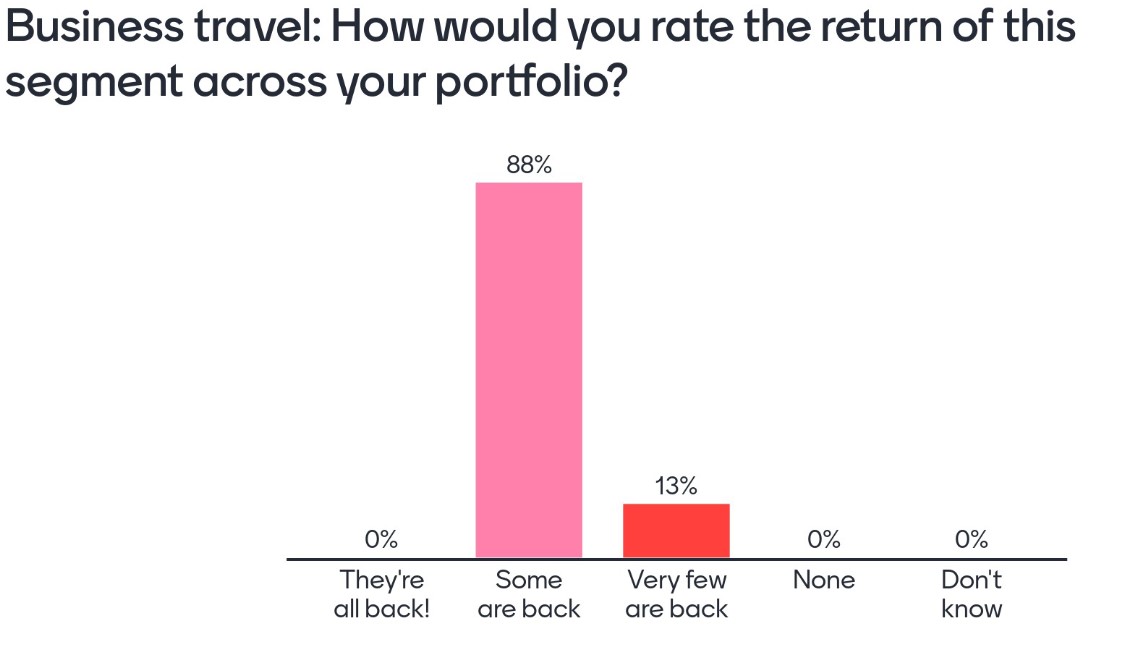Weekend leisure pricing power, a strong uptick in transient demand, and the gradual rebound of business travel — these are some of the trends that hospitality’s ownership group leaders have been taking note of. HSMAI recently gathered insights from leaders at Apple Hospitality REIT, Ashford, BRE Hotels and Resorts, Noble, Pebblebrook Hotel Trust, Summit Hotel Properties, and Abu Dhabi National Hotels during its Ownership Group Commercial Executive Roundtable.
One key area the group discussed was the gradual return of business travel.

“The business travel we’re seeing is still small- to mid-sized businesses,” one roundtable participant shared. “It’s not necessarily the larger businesses, which may have more restrictions in place than the smaller companies.”
“We’re also seeing that corporate business isn’t just booking through the GDS, it isn’t just booking into the negotiated segment,” another group member added. “It’s booking retail, discount, OTA. We are always asked about commercial versus leisure travel, and it’s hard to make assumptions on where that business is booking.”
The combination of business and leisure (aka bleisure) travel, the group agreed, has also made an impact. As one leader states, “There is definitely a bleisure bleed, and I think that’s what’s boosting the performance of those shoulder nights. Historically, those Sundays and Thursdays were the weakest, but fortunately, we’re seeing a bit more demand.”
When it comes to monitoring the return of the corporate segments, the group said they’re watching the following:
- Kastle reporting
- GDS volume against historical averages
- A360 and D360 trends
- Brand pace information
- Press releases and Google keyword search volume by market
Another key area the ownership group leaders talked about was talent. Availability of qualified candidates in the industry and company culture were rated the top two challenges facing commercial talent in hospitality. Compensation and benefits as well as a lack of clear career path and growth options followed closely behind.
Despite these challenges, everyone is working to create opportunities to build (or rebuild) their teams and continue to strive toward growth. They identified various best practices related to developing, retaining, and attracting commercial talent in their portfolio.
Developing Talent
- Ensuring participation in calls and attendance at property visits
- Dedicating time to work with team members who show an aptitude and desire to learn more about the discipline
- Training, cross-training, and providing additional exposure to commercial
- Engaging with and bringing strong supervisory-level associates into owner revenue/sales-focused meetings
- Getting to know team members and their goals, and identifying what drives them
Retaining Talent
- Making sure team members have all the support they need, specifically those who have been “doing more with less” over the past two years
- Fostering a strong company culture and ensuring full staffing to reduce overworking
- Leveraging technology where new employees can’t be added
- Providing a flexible work environment and ensuring fair compensation
- Spending more time listening to commercial leaders’ challenges and desires, and helping them prioritize their tasks
Attracting Talent
- Proving value to “attract the rockstars we’ve worked with in the past”
- Maximizing on trust to re-attract talent. “We are finding that the character and reputation prior to the pandemic is paying dividends.”
- Pitching company culture and benefits
- Promoting from within across the portfolio, even if it crosses management companies
- Maintaining good relationships with past DORMs
